Fall/Winter 2025-26
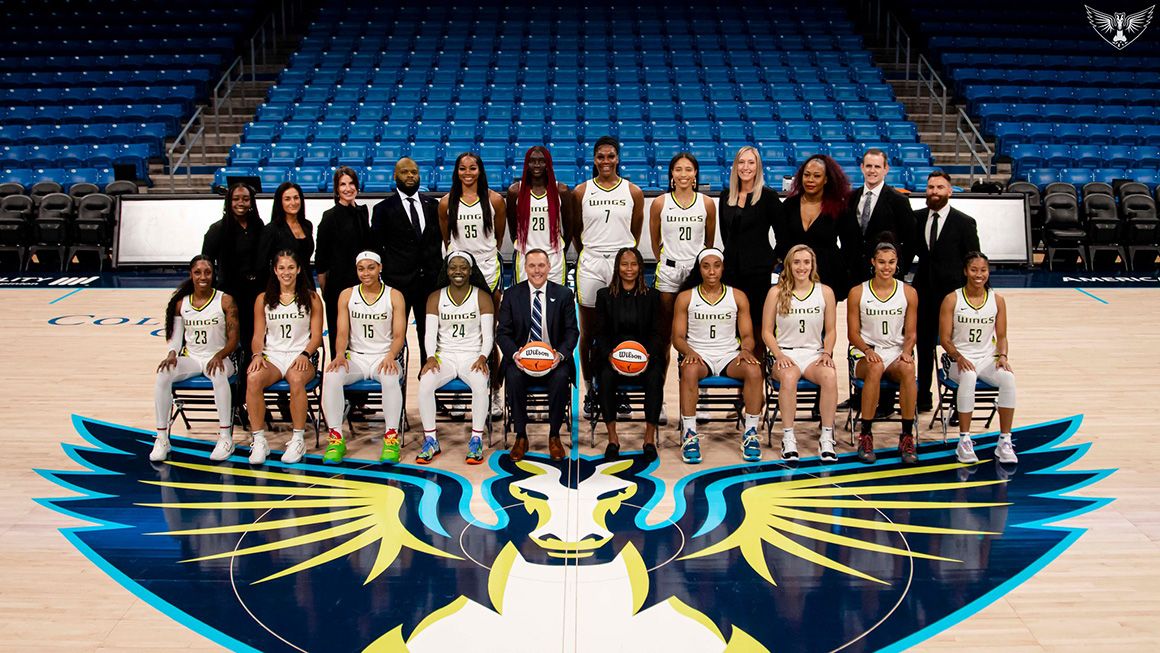
You might recognize the name Greg Bibb ’ 96 from when he called Marist basketball games — now he calls many of the shots as President, CEO, and Managing Partner of the WNBA Dallas Wings.
Greg Bibb ’96 always knew he wanted to be involved in sports. His love of athletics would take him from calling basketball games for Marist’s TV station all the way to serving as President, CEO, and Managing Partner of the WNBA’s Dallas Wings.“I had that sports aim and I felt that a communications degree with a concentration in radio, television, and film was the track to get there,” said Bibb, who, as an undergraduate, was the sports director for Marist’s TV station and covered sports for Marist’s newspaper, The Circle.Knowing the Marist internship program had contacts with the major sports networks, Bibb hoped he would earn a coveted internship if he worked hard enough. “I had that opportunity my junior year and had a chance to work on Monday Night Football and College Football Saturday,” he said. “It taught me so much about keeping up with a fast pace, working hard, and gave me that much more of a feel for the sports world.” He would one day be connected to an ABC Sports broadcast in a way he could never have imagined.“After Marist, I was able to take my sports background into a public relations opportunity with a soccer team and that actually forged a whole other path to grow in the industry,” he said. Eventually getting a chance to switch to the operational side, his roles have included executive VP of business operations of the NBA’s Washington Wizards and chief operating officer of the WNBA’s Washington Mystics. The latter he began in 2007 and then was in both roles starting in 2010. “I had the opportunity to try many things and learn from smart people,” he said.After later founding a sports-focused investment fund in 2013, he left basketball for a couple of years. A partner in the business, Bill Cameron, had an idea: come back and help him with his own WNBA team. “Getting back to being involved with the WNBA was a thrill,” Bibb said. “Bill was looking to move the Tulsa Shock to Dallas, the team today known as the Dallas Wings, and he asked if I would join the ownership group and lead the business.”“With the Wings, I’m in charge of all aspects of the organization. For example, growing our broadcast offerings… At one time, the team had a half dozen games on TV.” Referring to the 2022 season, he went on, “This past` year we played 36 games—and all 36 were broadcast. The telecast reaches all of Texas and Oklahoma, three-quarters of Arkansas, and half of Louisiana. That’s 11 million households that can see a Wings broadcast.”But one for ABC Sports, a playoff game against the Connecticut Sun on Aug. 21, was particularly momentous. “If you would have told me five years ago that we would be playing a playoff game on ABC before almost 800,000 viewers, I wouldn’t have believed you,” he said.But it’s more than the numbers for Bibb; it’s the hope. “I got involved with the WNBA to begin with partly because my wife, Tara, and I welcomed a baby girl,” he said. “This year is the 50th anniversary of Title IX and it’s important to create more opportunities for girls and women. My daughter has grown up around the WNBA and sees she can do anything she wants if she is willing to work for it. And it’s been just as important for our son … More opportunities need to exist for female athletes to be able to make a living professionally, and the success of the WNBA has a chance to help in that area.”Bibb, ever the competitor, doesn’t just have basketball nets on his mind, but lacrosse ones, too. He is also President, CEO, and Managing Partner of the professional lacrosse team Panther City Lacrosse Club, in Fort Worth, Texas. The team concluded its first season in the National Lacrosse League with high hopes in what he says is the fastest-growing city in the country, not to mention the 13th largest. “It combines the game of hockey that I played growing up and the game of basketball I’ve spent so much of my career in,” he said. “The participation rate in the sport keeps growing, there are cross-promotional opportunities with the Wings, and there’s the excitement of 20 to 30 goals a game on average. It’s another role for me that’s a great deal of fun…And, hey, isn’t fun what sports are all about?”
30 Jan 2023
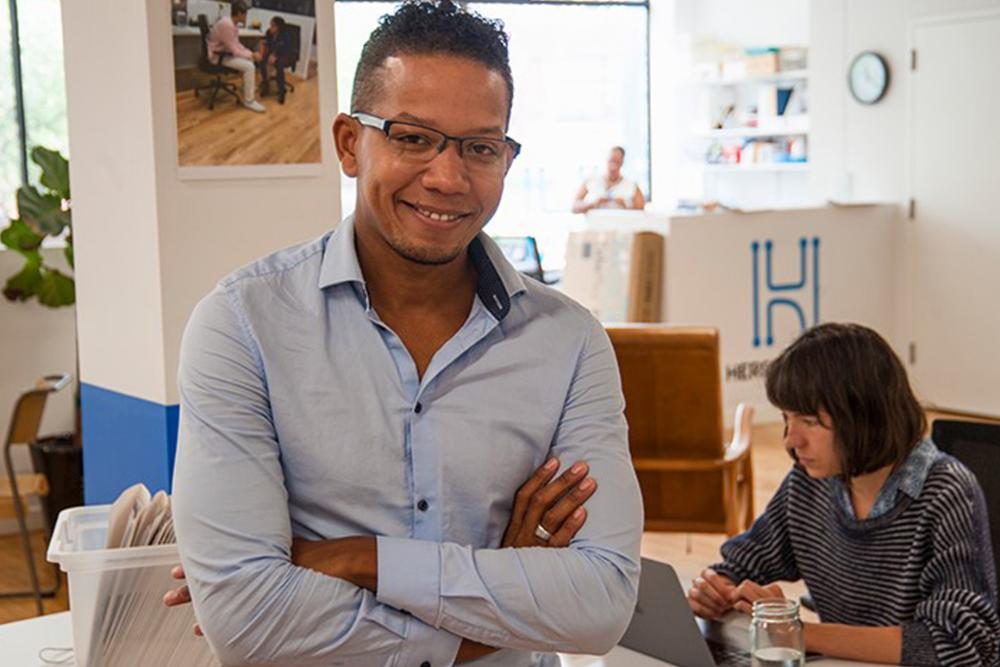
Marist alumnus Dr. Edward Summers ’04/’06M, founder of Bronx-based the Thinkubator, has been named to Robin Hood’s Power Fund, a new initiative supporting leaders of color and their organizations.
Marist alumnus Dr. Edward Summers ’04/’06M, founder of Bronx-based the Thinkubator, has been named to Robin Hood’s Power Fund, a new initiative supporting leaders of color and their organizations. Robin Hood, New York City’s largest poverty-fighting organization, funds impactful and scalable solutions to lift families out of poverty. The Power Fund invests in leaders who share Robin Hood’s mission of increasing economic mobility while championing racial and economic justice. Summers has dedicated his career to economic development in his hometown of the Bronx.To combat the barriers leaders of color face in accessing philanthropic dollars, the Power Fund takes a three-fold approach: a meaningful investment in an organization; targeted capacity-building and technical support; and a self-directed investment in the leader’s own development and elevation. The Power Fund was seeded with an initial investment of $10 million by Robin Hood and investors such as the Stavros Niarchos Foundation, BlackRock, and Capital One.In 2020, Summers founded the Thinkubator, an innovative nonprofit that provides education, career, and work-based learning opportunities for low-income youth in the Bronx. The Thinkubator harnesses their creativity through a youth-led design thinking consultancy, internships, workforce training, career development, job placement, a Youth Council, educational programming, and advocacy. With financial support from the Power Fund, the Thinkubator can now enhance and expand its work. Said Summers, “I am excited, humbled, and honored by this opportunity to elevate the work and impact of the Thinkubator. I look forward to the transformational impact this funding will have on our organization and on the youth and communities we serve.”A two-time Marist graduate, Summers served for seven years as Presidential Fellow and a member of the senior leadership team under Marist President Dennis J. Murray. He is currently on the College’s Alumni Executive Board as well as its Diversity & Inclusion Alumni Advisory Board.
21 Jul 2021
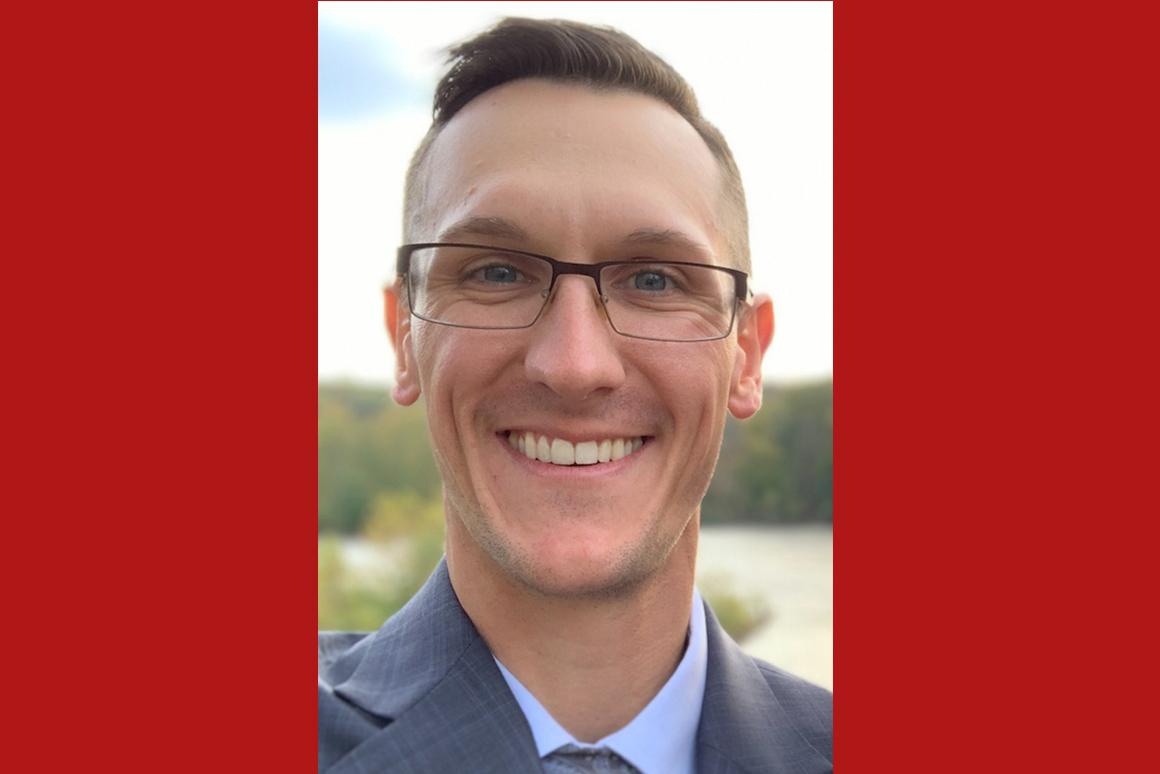
Matthew Szymaszek, DO, has been helping people fight the coronavirus from the outset of the pandemic.
Matthew Szymaszek, DO, has been helping people fight the coronavirus from the outset of the pandemic.The Simsbury, CT, native and long-distance runner for the Marist track and field team graduated in 2007 but returned to the College to finish research that he started with Dr. Zofia Gagnon, a former associate professor of environmental science, before taking the MCAT — the Medical College Admission Test, a standardized test that is part of the medical school admissions process — in 2008. He began medical school at the Lake Erie College of Osteopathic Medicine in Erie, PA, where he met his wife, Lindsey, in 2009. After originally settling down in Delaware, the couple moved to Colorado. In the fall of 2019 Szymaszek started working in critical care for Pulmonary Associates in Colorado Springs, CO. Just a few months later, the world was rocked by the coronavirus. In March 2020, his work environment started changing. “I don’t think there was a single non-COVID patient at one time, and we have a couple different ICUs,” he said about the period around Thanksgiving 2020. “I think one of our towers — 16 beds — was all coronavirus patients, all on ventilators.”As the weeks and months went on, more data and research showed that there were more than just respiratory issues to deal with, namely blood clots that formed in kidneys. Still, day-to-day responsibilities didn’t change all that much. Szymaszek’s routine, he said, consists of “seeing everybody, making sure their work of breathing hadn’t changed, making sure they didn’t develop any other secondary organ disfunction — particularly, any kidney dysfunction — and then it’s symptomatic management after that.” Workplace efficiency, Szymaszek explained, was the primary way his job changed. “Taking care of patients is the primary focus,” he said, “but certainly, you still have to document everything that you’re doing. I think that was the biggest time crunch — trying to see everybody, making sure you weren’t missing anything, making sure all the nurses’ needs were addressed, talking with families.” Since the information about the virus was so fluid, the latter task was time-consuming and difficult to address. Hospital procedures and operation plans were updated daily, primarily in the limitation of visitors at the hospital and how to avoid clutter in ICUs. Patients were admitted to higher levels of care only when their need for additional oxygen escalated. Szymaszek and the other doctors gave input to the hospital’s higher-ups as well as each other. “It was our anecdotal experiences day in and day out that we would share with one another and learn from those things,” he said. One experience that proved to be an astute observation by one of the doctors was the beneficial impact of steroids. Results in the Randomized Evaluation of COVID-19 Therapy (RECOVERY) trial involving hospitalized patients with COVID-19 showed that using dexamethasone over 10 days improved mortality.Learning from experience was a critical part of fighting an unknown enemy. “Our system as a whole, early on, developed a treatment algorithm as things were evolving and coming out of other countries,” Szymaszek said. The components of that algorithm have been and continue to be in flux. At first, they used convalescent plasma donations from recovered patients, which contain antibodies that can fight off the virus. Treatments that have been mainstays, Szymaszek explained, are steroids (such as dexamethasone and Solu-Medrol) and anticoagulation medicines, which help protect against blood clots.Of course, no treatments were discovered to be a magic wand. Steroids brought along problems in people with preexisting conditions, namely with blood-sugar levels. “That’s always been an ongoing battle…because they’re on high-dose steroids off and on for weeks and weeks,” Szymaszek said. “And if they have already have some underlying diabetes and other issues, it just becomes a nightmare to get those things under control.”Vaccines initially slowed the progression of cases and severity of disease, but the advent of the delta variant has only spurred more hospitalizations and unprecedented "crisis standards" of care for some hospital systems. “We continue to have a steady influx of patients infected with coronavirus not just from the local community but also from hospital systems both in and out of the state,” said Szymaszek. “In the beginning of the pandemic, most patients were hospitalized with COVID and there was a noticeable decline in other medical conditions such as stroke or cardiac conditions and even trauma-related cases. Now, we have an increase in both COVID and other medical conditions which is why trying to find open beds for some systems is a challenge. At this stage of the pandemic the vast majority of cases can be prevented with vaccination, and yes, there are going to be breakthrough cases as more people are vaccinated, but the chances of requiring hospitalization or death are incredibly reduced. “The science is constantly evolving and I think that's what is hard for people to understand. What we knew a year or a few months ago may not be true today as we continue to learn more about this virus and its variants.” Szymaszek has paved himself numerous different paths to unwind and get away from work. One of the reasons the Szymaszeks moved to Colorado was to be close to Lindsey’s family so that her parents could help watch their children. Another was that it offered them plenty of outdoor activities. It’s a gold mine for the outdoorsy couple, who live on the north side of Garden of the Gods Park, in the foothills of Pikes Peak Mountain, and within hours of numerous skiing resorts. Szymaszek likes hiking, biking, fly fishing, and taking his boys — six-year-old Owen and five-year-old Evan — walking on nature trails. “My boys are in school and a local mask mandate has dramatically cut cases and quarantines for students and teachers when compared to when it was optional.”Staying true to his roots as a long-distance runner, Szymaszek competes in time trials with his college teammates. The pool of competitors features Sean Hopkins ’05, Sean Prinz ’06, Justin Harris ’07, Michael Schab ’06, and Michael Rolek ’08. Out of boredom during quarantine time, Prinz proposed the idea of doing competitions to stay active. They would pick various events and share the results with each other.Head coach Pete Colaizzo ’86 remembers Szymaszek — or as he called him, CT, the abbreviation for his home state — as “one of the highest-mileage guys on the team,” he said. “Always ran a lot. Always ran twice a day — early morning runs, late night runs, in addition to our practices. He’s the type of guy you just want on the team.” Szymaszek continues to participate in triathlons and half Ironmans, with more races on the horizon this winter and spring. For him, running has always been more than exercise; it’s an emotional outlet.“I don’t think I would have been able to get through med school if it weren’t for the running,” he said. “That was the only thing that was consistent, [that] I knew I could rely on, to go out and clear my mind, think about stuff. That certainly still holds true now.”
21 Jul 2021
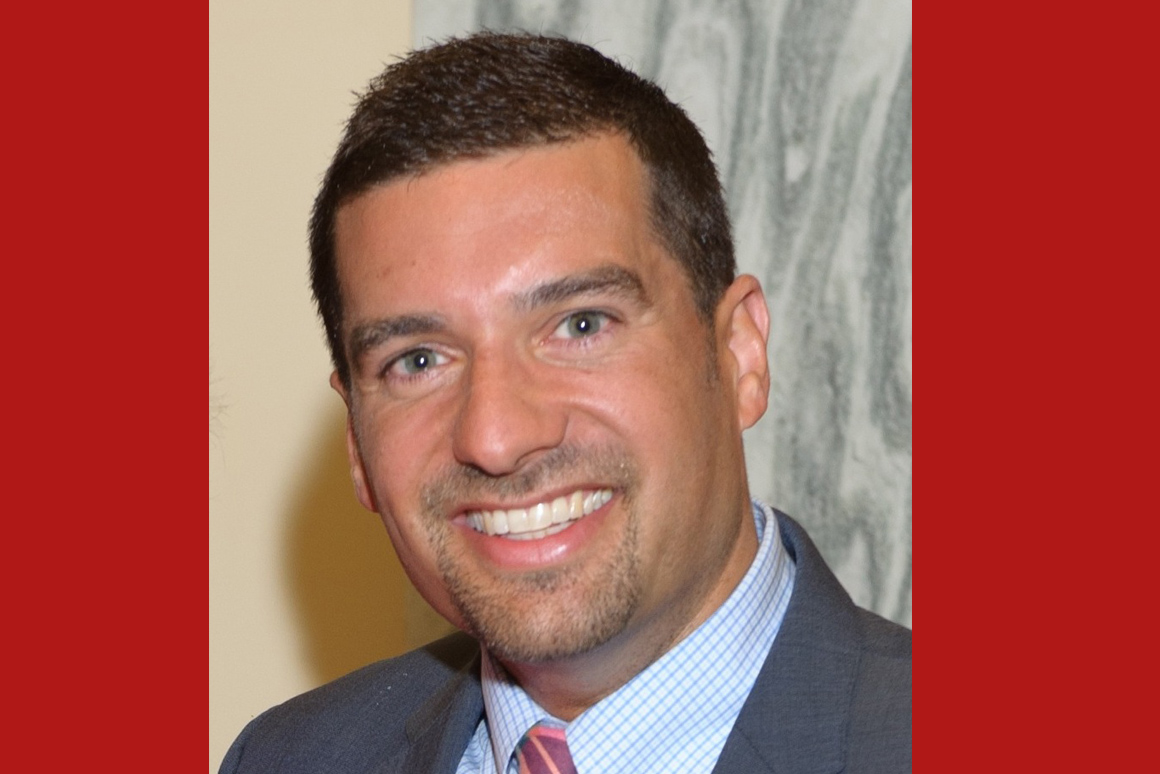
Assisting a foundation in supporting Maine nonprofits.
One reason Justin Burkhardt ’02 took his current job with Harvard Pilgrim Health Care, in Portland, ME, was because the company was “mission-driven,” he says. Throughout the pandemic, he has had an opportunity to support that mission, alleviating food insecurity.Originally from Milford, NH, Burkhardt was a political science and American studies major at Marist. After graduating, he worked for Gov. Jeanne Shaheen, the first female governor of New Hampshire. When Shaheen became a US senator, Burkhardt joined her Washington, DC, staff and served as deputy chief of staff. After six and a half years on Capitol Hill, he relocated to Maine with his partner, David, and took a position as the marketing strategy manager with Harvard Pilgrim, a not-for-profit health care services company based in New England. The company’s mission is to improve the quality and value of health care for the communities it serves throughout the Northeast.His position involves not only developing marketing strategies but also assisting the Harvard Pilgrim Health Care Foundation in supporting Maine nonprofits. One program has been especially meaningful to him: Harvard Pilgrim’s Greater Portland COVID-19 Relief Meal Delivery Project.“During my time at Harvard Pilgrim, I have been involved in dozens of initiatives focused on giving back to the community,” he says. “However, this may be one of the most impactful.”When the COVID-19 pandemic hit in mid-March of 2020, Burkhardt was sent from his Portland office to work from his home in Cape Elizabeth, ME, for the rest of the year. That didn’t stop him from making an impact on his community, though. As part of his work with the foundation, he identified a Portland-based nonprofit, Cooking for Community, worthwhile of support. This newly formed initiative brought together food producers, restaurants, and agencies to ease food insecurity in the state. “Both of our missions aligned to help those in need,” said Burkhardt.Harvard Pilgrim partnered with Cooking for Community and the YMCA of Southern Maine to deliver meals to individuals and families impacted by the pandemic. Cooking for Community coordinated with local restaurants to prepare weekly meals, using many ingredients purchased from local farms. The YMCA of Southern Maine delivered the meals to homes across 24 towns. In its first 11 months of operation, from April 2020 to February 2021, Cooking with Community served more than 92,000 meals. Currently 2,200 meals a week are distributed through its partnerships with 20 social service organizations and 20 restaurants, putting dozens of food industry workers back to work.In addition, Burkhardt reached out to Maine’s nonprofit community to raise awareness about additional grant opportunities through the Harvard Pilgrim Foundation. From March to July 2020, the foundation gave more than $1.7 million in COVID-19 relief grants to help more than 70 small and large nonprofits throughout the state of Maine. “It feels,” said Burkhardt, “like we made a positive impact.”
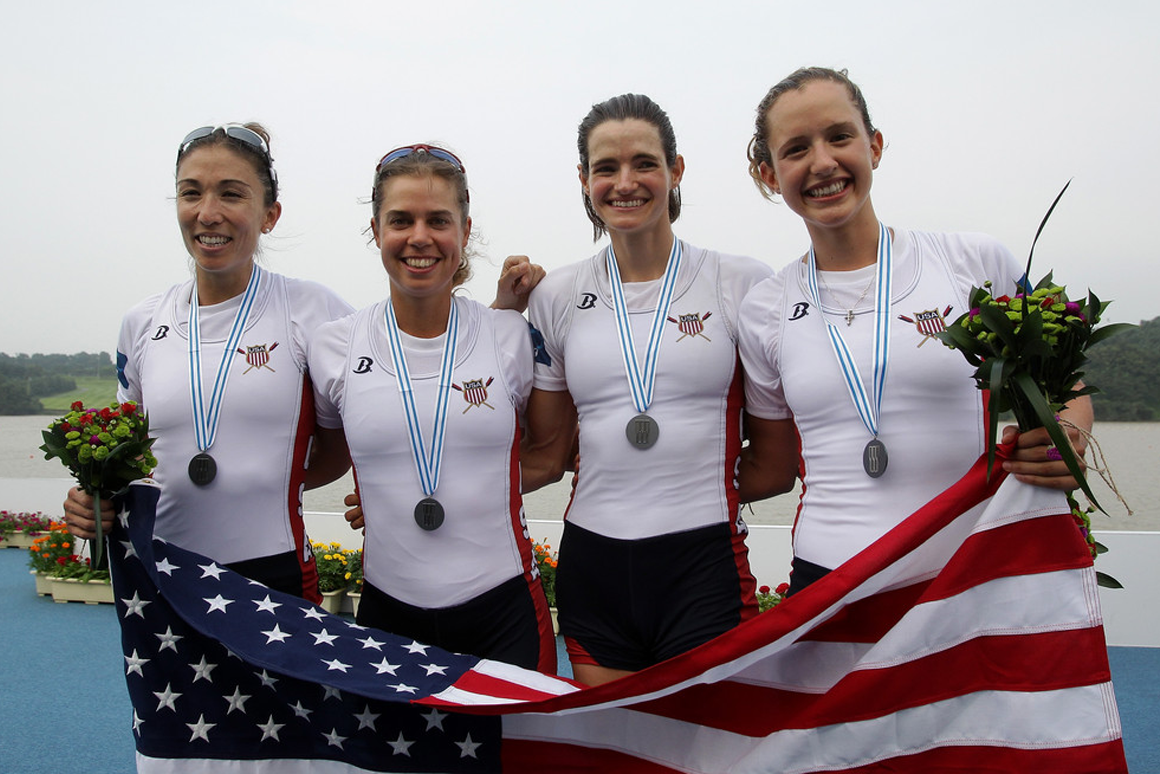
Former Marist rower Hillary Saeger ’07 made the leap from the river to the ocean when she was asked to join the USRowing Coastal Development Group this past February.
Former Marist rower Hillary Saeger ’07 made the leap from the river to the ocean when she was asked to join the USRowing Coastal Development Group this past February. In contrast to traditional Olympic-style rowing, coastal rowing takes place in the rougher waters of the coastline and ocean. Competitors must deal with not only the surf but also other challenges that occur in open waters such as tides and currents. In her role, Saeger hopes to lead the way for the transition from traditional to coastal rowing and to make it more accessible for all athletes. “We want everyone to have the opportunity to try coastal rowing and take it to any level they want to,” explained Saeger. She noted that participants are hoping to increase interest in the sport in anticipation of its entry into the Olympics in 2028 Los Angeles. “I am looking forward to getting someone into a coastal boat for the first time and showing them what it's all about and how much more interesting it can be than traditional rowing,” she said.After graduating from Marist, Saeger returned to Boston, where she joined Riverside Boat Club and learned to scull. She trained for her first national team selection race two years after graduating. “I made the national team in 2009 in the lightweight women's quad and went on to place third at the world champs that year. After that, I stayed in the rowing community in Boston and went on to make a total of seven national teams, and earned three Worlds medals.” She took a break from lightweight rowing in 2019 and instead trained for the Coastal World Championships in Hong Kong, where she raced in the double and quad, placing fifth and sixth respectively.Saeger’s favorite rowing memory is from a race in Bled, Slovenia, for the World Championships in 2011. “I was in the lightweight women's quad and we were getting faster each race we did there and made it into the A final. During the A final race, in the last 500 meters, our stroke seat let out a roar and the whole boat just started moving faster. We finished and we were looking at the giant TV screen awaiting results. We got third by a tenth of a second and we all rejoiced together. All of my favorite memories involve working in a tight group and making something amazing happen because everyone is working together and trusts one another. That's when anything is truly possible.”Saeger was also named to the MAAC's 40th anniversary women’s rowing team, which highlights some of the top rowers in MAAC history. “I am honored to be recognized for my achievements over the years,” she says of the experience. “After college it has always felt like a continuum from what I learned at Marist. I took what I learned from rowing in the eight, but most important I took away what a committed group of women can do if they never doubt what they can achieve together. We were never the tallest, strongest, or most technical boat out racing but we definitely had the biggest heart, and that is what made our boat most successful. I hope my achievements can be shared with everyone I have rowed with at Marist and inspire others to keep going for their goals and dreams no matter what the odds seem against you.”
21 Jul 2021
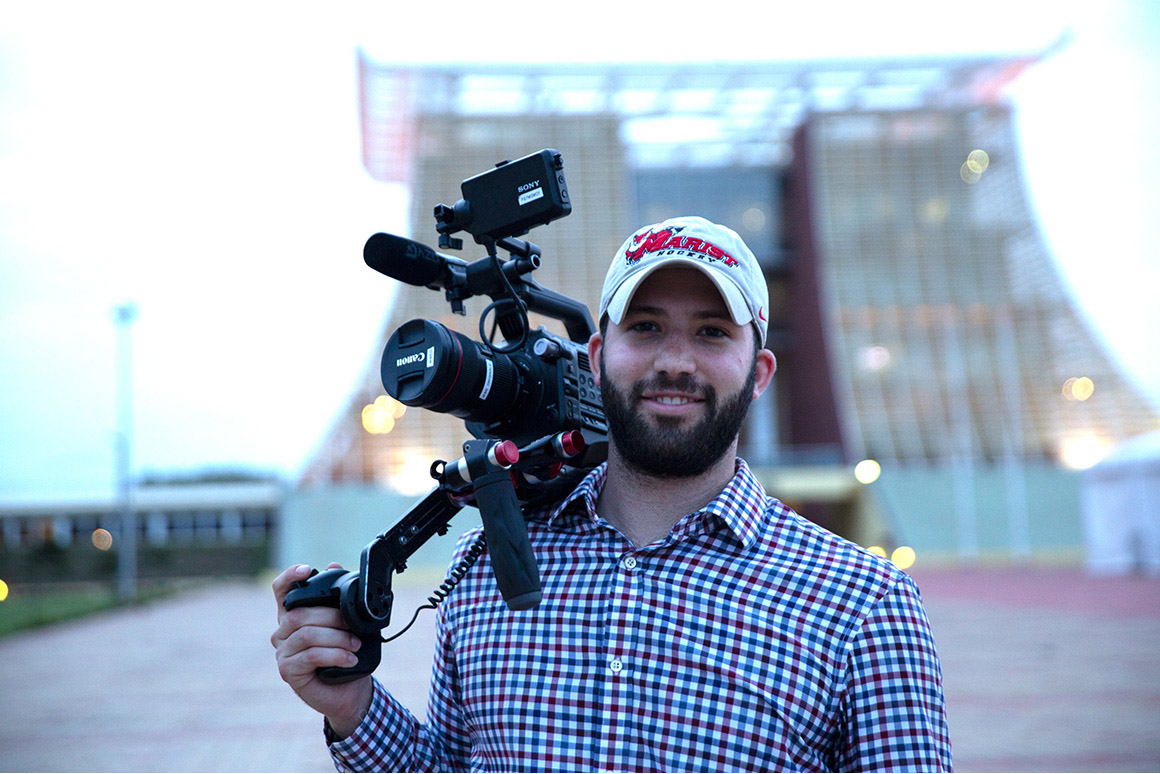
Graduation was upon him and he was tossing around a few different career ideas that were focused on freelancing.
Graduation was upon him and he was tossing around a few different career ideas that were focused on freelancing. Unsure exactly what he wanted to do, Alec Rizzo ’17 decided to stay in his home state of Connecticut and pursue what he really wanted to do: make films, of any kind, including documentaries. He purchased his own equipment and began to freelance, jumping at any opportunity to gain experience behind the camera. He knew this would get him closer to his ultimate career path in film. After a year of freelancing after graduation, Rizzo landed a position as a production assistant for network content at WWE (World Wrestling Entertainment) in Stamford, CT. The job has provided him with opportunities and travel he could have only imagined.Over the past year or so, Rizzo has traveled all over the country to produce content for the WWE Network’s original programming, including WWE24, a series of documentaries that chronicle a WWE superstar. One afternoon, he was heading to lunch when his boss, Dan Pucherelli ’02, approached him. “Hey, how do feel about traveling to Africa?” Pucherelli said. Without hesitation, Rizzo said yes, not only to gain experience, but also to embrace the opportunity to capture the culture, upbringing, and career of Kofi Kingston, WWE superstar and WWE champion at the time. The trip would be highlighted in the documentary WWE24 Kofi Kingston: The Year of Return, one of the many documentaries available on the WWE Network.Rizzo’s first step was to get his passport as he had never traveled out of the country. The trip began on May 29, 2020, with an overnight flight to Africa. Going to Ghana was a true homecoming experience for Kingston, his first visit back to his home country in 26 years, since leaving for the United States with his family as a child. With Kingston holding his first WWE championship title, it made for an even more dramatic return. While in Ghana, the film crew traveled to many villages and cities, witnessing a hero’s welcome for Kingston at nearly every stop over the course of the four-day trip. Rizzo and the film crew documented the entire trip, including Kingston meeting the president and king of Ghana. “I’d do it all again,” said Rizzo of the experience and knowledge he gained not only professionally but personally in learning about the culture and history of Ghana. Following Rizzo’s trip to Ghana, his position has taken him to Des Moines, IA, Charlotte, NC, Chicago, IL, and Houston, TX, just to name a few. Rizzo knew before graduating from Marist that he wanted to be involved in filmmaking. “If you told me at graduation I’d be doing this, I’d say perfect, it’s exactly what I want to do. It didn’t happen right after graduation. I had to go and find it.” He credits Marist for the internship opportunities and the hands-on classes that provided him with the skills and knowledge to “get out there” and freelance after graduation. More specifically, he recalls Jeff Bass’s class in Avid Media Composer, an industry standard for film and video editing. “I always had the confidence as soon as I got the camera in my hand that I’d be fine, I could do it, because of Marist.” His freelance work provided him the opportunity at WWE, but ultimately, it was Marist that set the foundation he needed. “I don’t think anything I’ve done is significantly special or is out of reach for anyone at Marist right now. Anyone can do what I did and am doing. There’s so much to do and learn at WWE,” he said. “You have to want it and have the passion for what you want to do.”
21 Jul 2021
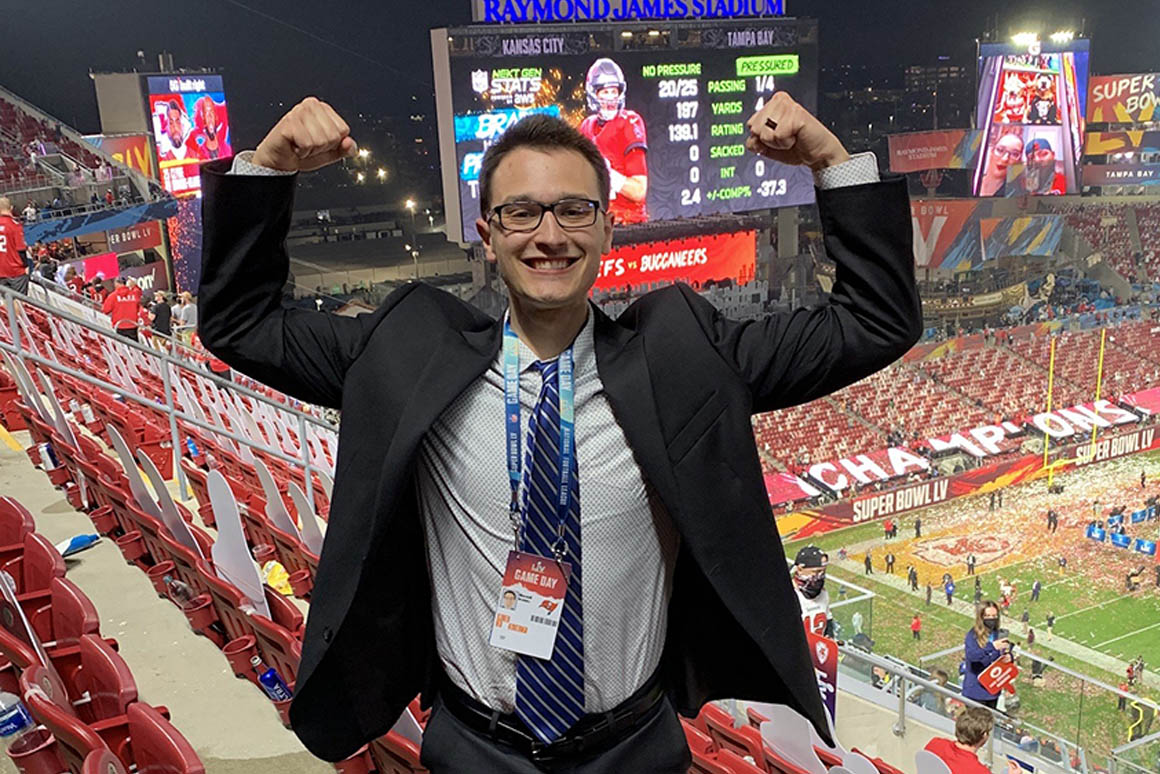
Maxwell Brodsky, Tampa Bay’s digital operations manager, is watching the game from a press box with a few coworkers, preparing content for the end of the game, which at that point they think will end in a Tampa Bay victory.
It’s the third quarter of Super Bowl LV. The Tampa Bay Buccaneers are leading the Kansas City Chiefs by a score of 21–9. Maxwell Brodsky, Tampa Bay’s digital operations manager, is watching the game from a press box with a few coworkers, preparing content for the end of the game, which at that point they think will end in a Tampa Bay victory. When the Bucs tack on 10 more points, the group feels all the more confident that the Bucs will secure their second Super Bowl in franchise history and first in nearly 20 years.Brodsky, who grew up a diehard New York Giants fan, said that rooting for a team that you work for is a much different experience than simply rooting for a team. “You always root for the team that you’re on ’cause you’re part of it,” the 2013 Marist graduate said. “You’re a family. It’s part of what you do. The NFL’s not a nine-to-five. It’s constant, so it’s a really huge part of your life.”When Tampa Bay linebacker Devin White intercepted a pass with less than two minutes remaining, Brodsky knew they sealed the deal. Brodsky’s been with the Bucs longer than all but six players. They didn’t win double-digit games or make the playoffs during the first four seasons he worked for them. This past season, they cleared both hurdles…and won the Super Bowl in dominating fashion. The press box, Brodsky explained, was a workplace, so there wasn’t supposed to be any cheering. Still, when the game ended, he couldn’t hold back his emotions. “I cried like a baby the second we won,” he proudly admitted. In 2016, the Buccaneers hired Brodsky to be a digital content coordinator, a position that tasked him — among other things — with posting videos and photo galleries to the Bucs’ website. He was promoted to senior digital content coordinator two years later, where he was given more stories to post as well as some new responsibilities — overseeing the format of the team’s website and app, pitching stories to writers, and more.As a digital operations manager, Brodsky is now tasked with dealing with the bigger picture. “What I try to focus on is basically ‘How does everything look? How can fans consume content? How well is our content doing?’ ” he said. Search engine optimization for website content is a big part of his job, as is using Google analytic tools to judge how well the content is doing. Brodsky put in years of hard work for multiple NFL teams before experiencing that dream-come-true moment. He studied sports communication at Marist. “All I knew was I wanted to be in sports in some capacity. I took as many classes as I could in sports comm.” He took journalism classes, which paid off in an unexpected way. Writing stories, he said, “wasn’t one of my fortes” but the classes taught how to write and structure titles and descriptions, a big part of his job.One class that he took and greatly enjoyed was a football coaching class taught by head coach Jim Parady and defensive coordinator Scott Rumsey. Brodsky excelled and inquired with them on being further involved with the team. He was hired as a student assistant. Among the many responsibilities he had, Brodsky cut film, set up drills, worked with quarterbacks, wide receivers, and tight ends during practices, and helped coordinate special teams during games.Brodsky’s start in the sports world came as an affiliate editor for NBCOlympics.com. He wrote recaps of events, compiled analytic reports, and more for the 2014 Sochi Games. Following that, Brodsky interned with the New York Jets for six months and Green Bay Packers for a year. With the Jets, he worked with both digital media (uploading articles, photo galleries, and videos to the team website) and social media (creating posts for various platforms, mostly about the Jets cheerleading squad). He started to drift toward the digital media side in Green Bay, where he updated the team website, posted/created content, and coordinated live interviews from Lambeau Field.Moving to the location of each position, Brodsky said, is a lot to handle. He has lived in the market for each team he worked for, including three different apartments during his time with the Bucs. For the native of Connecticut, each place he has lived in, even New Jersey, the location of the Jets, is unique.Brodsky had to spend much of his time without his then-girlfriend, Rebecca, who was living in Japan and working as an English teacher. He was alone in Wisconsin and for the beginning of his time in Tampa. Rebecca returned from Japan with a cat, which necessitated a move to accommodate Casper, their new pet. They got another cat, Luna, before finding a townhouse to call home and tying the knot this past May.Wedding rings were the only rings in fashion for anyone associated with the Buccaneers when Brodsky arrived. The team hadn’t made the playoffs since 2007 and was toiling in mediocrity since 2015. The football gods finally smiled on Tampa Bay in the 2020 offseason, when Tom Brady decided to sign with the team. Brodsky had to prepare to go live at 8:00 in the morning the next day, which required him waking up four hours earlier to get everything ready.Brodsky, having experience with good and bad teams, said it’s much easier to cover a team that’s good because there is so much more to work with. “You have to be hopeful for the future, which is one of the important things, as well as focus on the specific good things,” he said. “So, if there’s a really cool highlight, roll with that. If the game’s not going so well, you have to just mention it and move on.”That probably won’t be the case as long as the Bucs keep this team intact. The young playmakers surrounding Brady and a rock-solid defense should allow Tampa Bay to compete for more titles until Brady decides to hang up his cleats for good. The excitement isn’t lost on Brodsky. “I get to listen to Tom Brady talk on a press conference for my job. It’s amazing,” he said.All of Brodsky’s work culminated in a night he’ll never forget. “The fact that we get to win it in our own home stadium was the coolest experience of my life,” Brodsky said. The road to get there has been a lifelong journey. He has always been a football fan, taking opportunities to get involved the sport and watching the NFL for as long as he can remember. Now, he’s a part of the league he grew up loving. “It’s always weird when you mix your hobby with your profession. But if you can do it and you can make it work, it’s just a great thing.”
21 Jul 2021
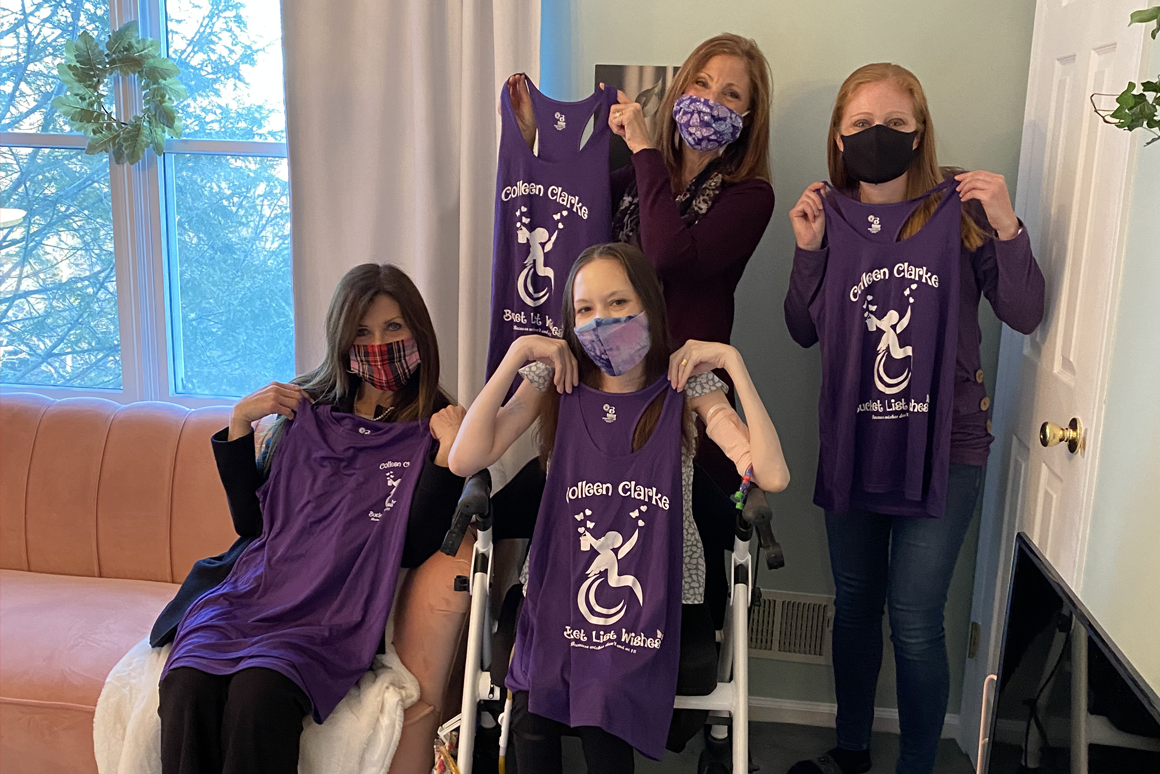
Lauren Clarke ’13 and her family started a wish-granting charity honoring her sister.
Lauren Clarke ’13 and her family started a wish-granting charity honoring her sister. Colleen Clarke Bucket List Wishes Inc. is a 501(c)3 nonprofit foundation granting wishes to young adults with a life-limiting physical disability or life-threatening diagnosis. Through social media, Lauren reconnected with Allie Pasquale ’13 and Victoria Weisheit ’13. CCBLWishes was able to grant Allie the wish of redesigning a spare bedroom into a healing, oasis escape lounge and art studio. Victoria’s mother, Regina, served as the interior designer for Allie’s project. During the process, another group from the Marist Class of 2013 came together to donate an adorable mini-fridge to the room. “Allie and Victoria and I are forever grateful to Marist for bringing us together,” said Lauren, “and being able to reconnect through this experience was a gift to us all.”
21 Jul 2021